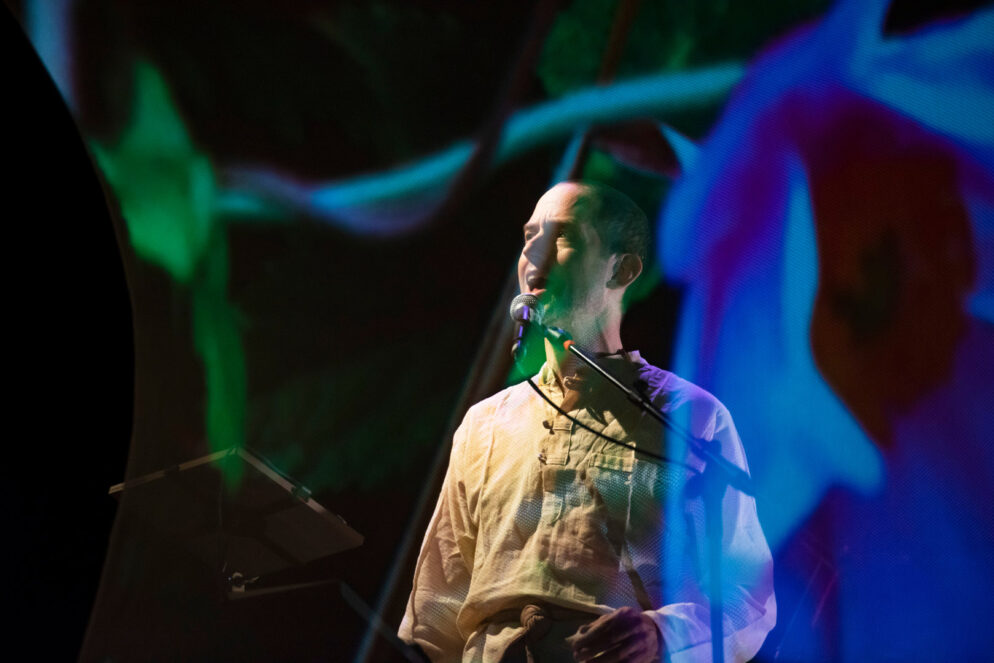Multimedia Performance Piece ‘Boy mother/faceless bloom’ Conceived and Premiered at CC
As a group of artists, none of us has ever worked with an institution where we felt as supported and free to develop our collective creativity as we have at Colorado College” says Joshua Kohl. That sentiment was expressed to Ryan Raul Bañagale ’00, associate professor of music and director of The Arts at CC. The kudos immediately followed the premiere of “Boy mother/faceless bloom” on Feb. 24 by the creators Juni One Set, comprised of artists Senga Nengudi, eddy kwon, and Degenerate Art Ensemble’s Crow Nishimura and Joshua Kohl.
The multimedia production is a radically collaborative piece drawing on mythology and autobiography with “large-scale sculptural and scenic design, live and recorded music [sung in English and Korean], poetry, and embodied movement to tell the story of a young boy who learns he will be a mother.” Transgender identity, parenthood, ancestral lineage, and excavation themes emerged from Juni One Set’s intensely organic process of combining their personal histories and artistic talents through live and virtual experimentation.
The piece was born in August 2018 in residency at CC between Creativity & Innovation at Colorado College and the CC Theatre and Dance Department. Senga, a Colorado Springs resident, is the common thread who was initially inspired by kwon’s musical prowess to collaborate. The work is co-commissioned by CC and the Contemporary Arts Center Cincinnati, with additional support from the National Performance Network and BASE Experimental Arts in Seattle. The show toured to Cincinnati and Seattle and ultimately will circle back to the Colorado Springs Fine Arts Center at Colorado College in Fall 2023 with a related multimedia exhibition of works from the show and its collaborative team.
“Boy mother” premiered at Norberg Studio in the Cornerstone Arts Center, and Bañagale called it “one of the most beautiful works of art I’ve ever encountered. A largely undefinable, but incredibly moving experience — made all the more powerful knowing the collaborative process that has brought it into existence.”
This production is not only the first premiere created through The Arts at CC, but also a key part of CC’s curriculum. This interdisciplinary performance piece welcomed 20 different courses from nine departments, including anthropology; art; feminist and gender studies; music, political science; race, ethnicity, and migration studies; sociology; Southwest studies; and theatre and dance to participate in workshops, class convergences, and performances.
Nishimura and Kohl of Degenerate Arts also co-taught a block last Fall with Dance Professor Patrizia Herminjard called Advanced Performance: Performance Install-ation. One student in that class, Madison Dillon ’23, a double major in dance and performance design minoring in physics, served as stage manager for the premiere.
“This project has given me more questions than answers in the best possible way. I’m thinking more about gender than I had before, about what it means to me personally, but also what it means in the context of the people we surround ourselves with and national identity,” Dillon says. “Can you separate where you’re from from your heritage? What is the best way to make art with multiple people?”
Bañagale adds, “What Juni One Set created speaks to the ideals that CC holds most true. It’s antiracist, it’s challenging, it’s collaborative in nature, it’s thoughtful, it’s asking us to reflect about what we do and how we do it. It accomplishes all the things that we hope each liberal arts student does instinctively by the time they leave here.”
Dillon remembers, “When Senga returned in person to collaborate, after a short absence, everyone lit up. When they got their original quartet back, the room just became electric. There were ideas flying left and right, and it was so exciting to just see everything changing so quickly.”
The professional development and networking opportunities students had with Juni One Set are giant, amazing opportunities for college students, as Dillon proves with this summation; “I thought it was going to be a really intense experience with these big professional artists who do professional art with a capital P and a capital A. But this has really taught me that making things and sharing things is really just about people. And that the more you realize that the better you can make art.”



